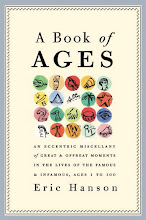Seventy years ago today Germany invaded Poland, assuming Britain and France wouldn't care about it any more than they had cared about Czechoslovakia. They did care this time. Neville Chamberlain was soon on his way out and Churchill, that irresponsible war-monger and back-number, was in Number 10 within the year. War would make him the man of the century.
But it's hard to call any war that killed 70 million people a good war. The heroes were heroic, mostly, and the villains were recognizable as monsters. The great novelists and artists of the 20th century set foot in this war. J.D. Salinger and Kurt Vonnegut fought in the Battle of the Bulge. Ernest Hemingway liberated the Ritz Bar in Paris. James Michener wrote some tales about the South Pacific and Rodgers and Hammerstein would make a musical about it. Norman Mailer was a rifleman in that same theater of the war. Graham Greene missed being killed by a German bomb because he was sleeping with his mistress at the time. Evelyn Waugh was an officer so hated by his men that he had to be reassigned for his own protection.
Joseph Heller flew combat missions. So did James Stewart. Afterwards he could no longer play wide eyed innocents. War added a layer of grit and cynicism and suppressed anger to his civilian roles. It was John Wayne, roughly the same age as Stewart, who stayed home to play war heroes on film. Heller's novel distilled war's insanity into a phrase: Catch 22. Vonnegut lived the firebombing of Dresden and wrote a novel around it. Salinger took a bullet out of the war and once everybody was home and safe he put it in the brain of Seymour Glass.
These personalities and their own particular versions of WWII are each included in A Book of Ages, as are Eisenhower and MacArthur and Patton and Roosevelt and Truman and Hirohito and Hitler, the people who made it happen. And Anne Frank, the quiet 14 year-old girl who died at Bergen Belsen.
Tuesday, September 1, 2009
The Good War
Subscribe to:
Post Comments (Atom)





No comments:
Post a Comment